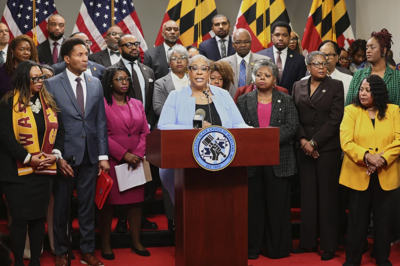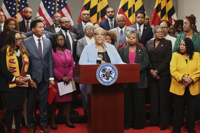MARYLAND - A bill that would create a commission to explore the potential impacts of reparations to the descendants of slaves in Maryland has passed the state legislature and now awaits Governor Moore’s consideration.
First introduced by Democratic Senators from Prince George’s and Baltimore, Senate Bill 587 would establish the Maryland Reparations Commission to study and advise on reparations for those whose ancestors were enslaved or impacted by inequitable government policies in Maryland.
The Commission would also be tasked with examining what types of reparations would be appropriate, including official apologies, monetary compensation, property tax rebates, home down payment assistance, business incentives, child care, debt, forgiveness, and college tuition waivers and reimbursement, according to SB 587’s text.
A preliminary report from the Commission would be required by January, 2027 and a final report and recommendation to the Governor later that year.
SB 587 passed the Maryland Senate on March 14 in a 32-13 vote before being introduced in the House of Delegates. On Wednesday, April 2, the bill was brought forth for a third reading in the House, sparking an often heated debate between Democrat and Republican Reps.
“This list of grievances that we spelled out all happened before I was born,” Rep. Matthew Morgan (R-St. Mary’s) said. “Before millions of Marylanders were born and had anything to do with slavery or discrimination. But we’re going to hold them accountable? What are we doing here?”
The Commission, Morgan argued, would be intended to establish a reparation tax.
On the other side of the aisle, Democrats defended the bill by citing long-lasting impacts of slavery and racial discrimination in the United States.
“I stand today as a descendent of formerly enslaved people,” said Rep. Jamila J. Woods (D-Prince George’s). “My descendants and the descendants of many in this room were traumatized, separated, and the intended prey of enslavement, racial discrimination, sexual violations, lynchings, and more.”
“This proposed reparations commission is a bold and necessary step to determine the most appropriate redress from the unending harm of enslavement, Jim Crow, and explicit racial policies that led to the current racial wealth gap, unequal educational opportunities, disparities in housing, healthcare, and attempts to erase our history,” Woods continued.
Ultimately, the bill was passed 101-36 on fully partisan lines Thursday, drawing applause from some House members.
WBOC spoke with Wayne Hartman (R-Wicomico and Worcester), who voted against the bill.
“There's definitely things in the past that were horrible, wrong, we can't fix,” Hartman said. “Does any amount of money fix those things? Is there an amount of money that will make this go away? And I don't have the answer to that."
Should Moore sign the bill into law, it will go into effect July 1, 2025.
WBOC reached out to Governor Wes Moore’s office for comment but did not immediately receive a response Thursday.


